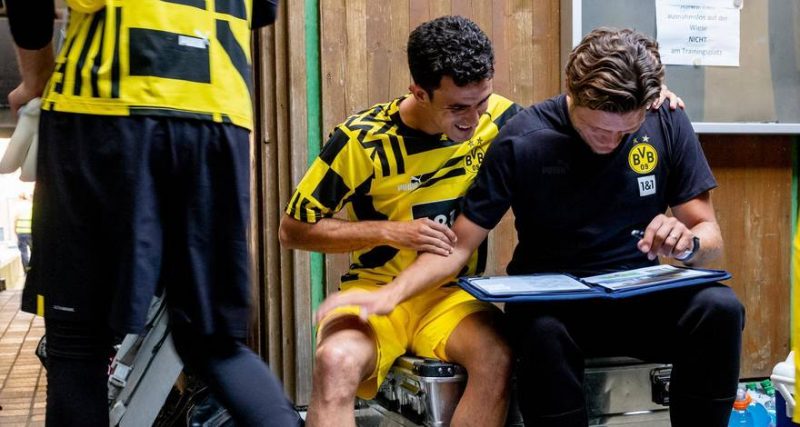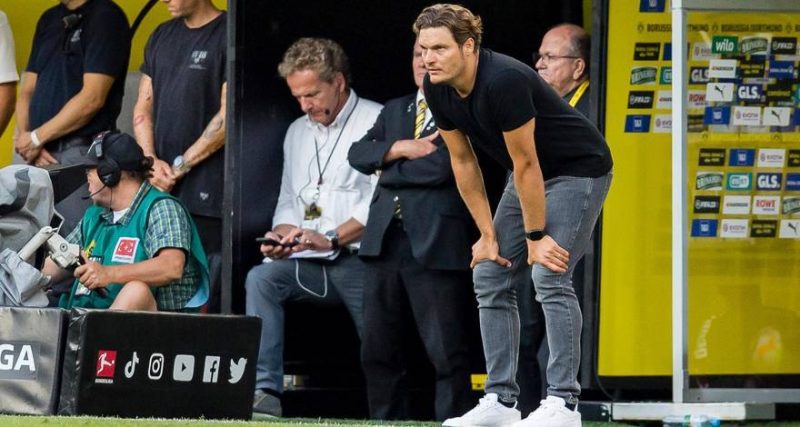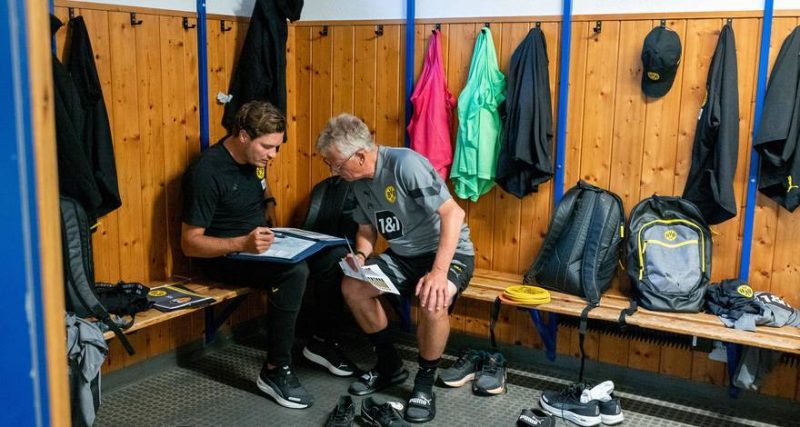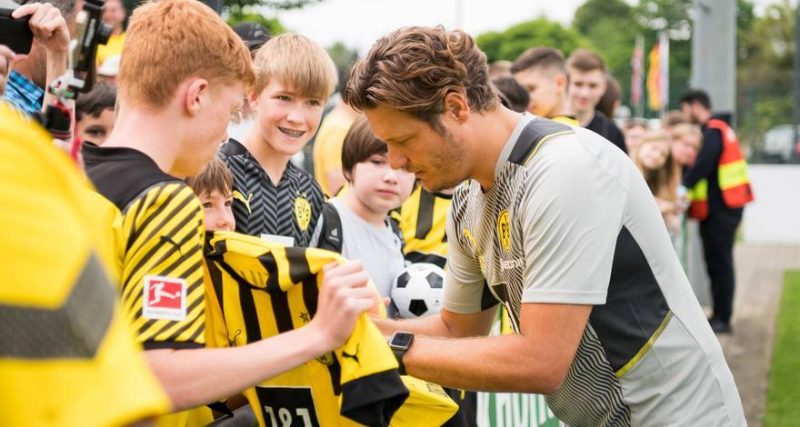Edin Terzic has completed his first pre-season as head coach of a Bundesliga team.
Edin Terzic has completed his first pre-season as head coach of a Bundesliga team. There was euphoria and a mood of optimism on the one hand, but also national players to be integrated late into the pre-season and the illness of Sébastien Haller. So Terzic’s plan, which was to be successfully implemented in the 60th Bundesliga season, was initially a balancing act: showing all our strengths on the pitch and trying to keep all our weaknesses hidden as much as possible.
Let’s begin this profile with the observation that Edin Terzic has brought about an astonishing change in mood at the club within a short space of time. His appointment as head coach again – this time for three years – is a boost for all those who (too) often missed the feeling of having been a part of something special in Dortmund last season.
Let’s pause briefly, close our eyes for a moment and just listen to Terzic in a special battle of wills against Valencia’s coach Gennaro Gattuso on the sidelines in Altach in Austria. Who is giving out the loudest instructions? Italy’s 2006 World Cup winner, known as the “growler” in his home country, sounds as if he sharpens his vocal cords with Brillo pads.
Let’s just sit back in the reassuring assumption that BVB and Terzic fit together like fish and chips: the club, who want to play more attractive football after a season which was unsatisfactory in terms of the cup competitions, and the coach, who is only 39-year-old, and it would not be surprising to find Black and Yellow blood flowing through his veins. Once before, from December 2020 to May 2021, Terzic has coached the team to success in an understated yet authentic manner – and conducted his players like an orchestra – especially in the big encounters, such as the triumphant victory in the DFB-Pokal final against Leipzig (4-1).
But we should not succumb to the temptation to praise BVB to the highest heavens straight away. After all, a good atmosphere doesn’t score goals. But with Terzic as a beacon of hope and a popular figure, and with some smart transfers business on the part of the new sporting director Sebastian Kehl, confidence is growing that this could be a successful new season. According to prevalent opinion, this Borussia bubble is not one that is likely to burst easily. Although there is hope for positive performances, the mood has been dampened slightly recently. Not so much because of the two defeats in the pre-season friendlies against Valencia (1-3) and Villareal (0-2), but because Sébastien Haller was diagnosed with a testicular tumour on 18 July. This news turned the buoyant atmosphere in Dortmund at the training camp in Bad Ragaz in Switzerland on its head. “We are all in a state of shock,” said BVB CEO Hans-Joachim Watzke.
So a profile like this must therefore at least touch on the fact that the job for Borussia Dortmund’s head coach has become more complicated and challenging right at the beginning of his tenure without the striker, who was seen as a key part of his plans. “As professionally as possible” – that is how Terzic would ask BVB to deal with the bad news about the loss of Haller and return to normality. His solution: come together and get back up again. Ideally, they could even draw strength from the setback.
In his first in-depth media scrum as boss, just a few hours after the medical report came back, you could feel what the striker’s illness meant to him. It was “brutally difficult” to talk about pressing or passing, development goals and future prospects at that time, said Terzic in the training camp in Bad Ragaz, Switzerland. The fact that football goes on regardless of the fate of individuals makes it possible to walk the narrow line between personal concern and the demands placed on him as the leader of the group to deliver performances and results.
Just one day after the players and staff gathered for a great show of solidarity with their teammate, two intensive training sessions are on the agenda. Neither the upcoming tour de force due to a particularly tight schedule nor the multitude of topics and ideas still to be addressed allow the group to take a proper break. On the one hand, regardless of Haller’s fate, the players in Dortmund have to get serious about football – on the other hand, they can “still be with Sébastien in spirit”.
After the famous cup win in 2021 and the brilliant finish to the season with nine wins in a row (and an aggregate score of 29-8) across all competitions, we had heard little from Terzic a year ago, who was subsequently appointed technical director. Only once at a panel discussion in his native city of Menden did he speak to a larger audience. It is a home game for him, less than a kilometre from the hospital where he was born on 30 October 1982. During the talk show, Terzic impresses with his competence, humour and quick wit. He wins over the hearts of the listeners who are not already familiar with him through BVB. At some point on this occasion, he tells us that almost every one of his previous interviews ended with the question of whether he would like to become head coach at Dortmund.
What a question. Of course, he wanted to.
Ten months later, Terzic reveals that, after his interim term as head coach ended, crowned by the cup victory, he had naturally felt the desire to “do that again”. But he didn’t expect it to happen so quickly. During his one year as technical director, he had set his mind to “become a head coach again one day”. But the fact that a) it would be at Borussia Dortmund and b) it would be as early as in the summer of 2022, “was not so clear then”. He rejected offers from other teams that came his way in the meantime – offers that would have been tempting to others.
Now he is back at the helm. The confidence of the board and the affection of the supporters are like a warm blanket. “His journey is the unusual story of a fan’s rise to the top. “When,” the newspapers of the Funke media Group ask, “when was a coach in Dortmund last loved so much?” This love is explained by the life story of the newly appointed head coach, while his track record and deep connection with his Borussia make him particularly popular.
Already as a child, Terzic was wild about his favourite team. Later, he worked in the BVB scouting department and earned his stripes working in the academy. Slaven Bilic, who celebrated his greatest success as a national player by helping Croatia to third place at the 1998 World Cup, enticed him away and took him first to Besiktas and then to West Ham United. As assistant coach to Lucien Favre, Terzic returned to Borussia in 2018 – and reanimated a “half-dead team” (Watzke) after Favre was let go. He also used the season as technical director and the accompanying change of perspective for self-reflection and further education.
Football games without sound
Terzic is a man who is keen to broaden his horizons and is never satisfied with the level of knowledge already achieved – he is always looking to learn. When dealing with football-specific questions as well as when it comes to being a leader of men and his team, Terzic is able to glean the valuable aspects from all that he has experienced, seen and also heard. Thinking about his sport and his profession is an ongoing and fluid process for him. He watches football games at home without the sound on, all alone in his room, to make sure he is one hundred percent focused. In doing so, he collects ideas and writes them down. Only recently, he watched a Spanish Clásico from the 2004/05 season and was fascinated by the pace at which Real Madrid and Barcelona were playing their passes. “You can get so much out of it,” he gushes.
Such insights and the impressive wealth of experience lead to a philosophy that revolves around dominance. Terzic chooses the necessary means to achieve that dominance according to each specific situation – and he uses a variety of different styles depending on his opposition and his own team line-up. Be it through ball possession, high pressing, switching the play, speed, aggression, the main objective is to make his teams play attacking and attractive football. “Edin has a clear idea of how he wants to play,” says Sebastian Kehl, “and he has a clear idea of how he wants to interact with the players.”
Terzic also gains valuable inspiration from documentaries produced about other sports. What do the coaches do differently in American football, ice hockey or handball? What insights does this provide for his own work? “Finding those things out,” says Terzic, “is a lot of fun for me.” One of the precepts of his work that has always been set in stone is that football is a “players’ game”. In other words: Terzic’s concepts are shaped and determined by the potential of the players on the pitch. “Of course, I have a general idea of how I think of football, but in the end, it is strongly influenced by the quality I find in the dressing room.”
The six months under his leadership from December 2020 to May 2021 already provided a taste of what is to come for Borussia Dortmund. Matthias Sammer, who analysed every aspect of Terzic’s first stint in charge from the stands, explicitly emphasizes the “high speed of pressing without the ball and a certain compactness”. The BVB advisor continues: “Patterns of attacks became increasingly evident and they looked to use the ball well.”
When Borussia Dortmund and Marco Rose decided to part ways in May, Terzic was considered a logical choice for the job. He knows the club from the ground up. In an interview with Kicker, Matthias Sammer only needed a single sentence to explain why all roads led to Terzic: “Through his entire demeanour and his idea of football, he puts into practice exactly what the club wants.” He described Terzic as a “very capable driving force” and having a “very fine, reliable and honest character.” Coming from the mouth of the external advisor Sammer, that is equivalent to a knighthood. Although expectations are high, Terzic takes the plunge and signs for three years.
In the very first days of training, it becomes clear what Terzic is looking for. The new sporting identity is to emerge from the interplay of all the team’s strengths: that we win. That should apply equally to the coaching team and players as well as to the overall orientation of the team: “We want to attack together when the opponent has the ball – and work together to produce a goal when we have the ball.” Showing all our strengths on the pitch and hiding all our weaknesses as far as possible – that’s his plan. He talks about implementing this plan together and as a collective until it is almost like a mantra. Players with an oversized ego will have a hard time with him: “We as a team are responsible for stopping the opposition from scoring and not giving away the ball so easily.” He sets his players a clear task: “to defend our goal with everything we have.” In the friendly against Valencia, he dislikes the number of 50-50 situations they lost because the Spanish side were “one step faster and more aggressive”.
Terzic is “massively up” for the task of instilling a footballing culture in Dortmund which puts an end to the long-running discussions about mindsets, attitudes and continuity. In any conversation with a potential new signing, Terzic delves in to “how important this issue is in the personality of each individual player.” The idea of turning on a certain mentality at the flick of a switch is something he has a problem with. He demands that his players show a will to win every day, in every training session, so that they can then “go full throttle every time” when it really matters. He will not offer free rides or give promises of set playing times. “The only promise I make to every player is that you can work out anything in the team.”
Responsibility
As a committed team worker, he gives his coaching staff equal responsibility for leading the group, as well as the leaders within the team. “The experienced ones who have been through a lot in their careers – it is important for me to get their opinion on certain topics,” he says, “that is why I involve them very often.” However, Terzic does not define leaders within the team exclusively based on their age or how many appearances they have made, but rather how they act and interact within the group. For example, he attests that Jude Bellingham, who has greatly enriched Borussia Dortmund’s football since 2020, “definitely [has] leadership qualities” and so it made sense that he promoted him to the third captain – even though the Englishman is only 19 years old.
Experts such as Jürgen Kohler and Lothar Matthäus have been raving about the fact that sporting director Kehl has breathed new life into the BVB squad. They named BVB as favourites for the title (Kohler) or the most serious of all challengers (Matthäus). Unlike the 1990 World Cup winners, Terzic has never been one to herald an amazing season before it has even started. First, he wants to deal with pressing issues such as the fragile defence (which conceded 74 goals in 46 competitive games last season) and the lack of stability (15 defeats) “before we talk about anything that will be awarded in May 2023.” Top of his agenda would be “good, consistent football”, stating “we want to make people happy. Not just once, but on a regular basis.”
In addition to specialist expertise and a talent for communication, Terzic’s great affinity with the club – and his strong sense of the club’s soul – is particularly appreciated in Dortmund. The responsibility to “make this team better” is something the coach regards as a matter of the heart. His special social skills are certainly not proving to be a disadvantage: on his first day in his role as head coach, when he is asked to give an insight into himself and how special the moment is to him, Terzic prefers to draw attention to Mateu Morey, who, after more than a year of injury, is working hard ahead of his comeback. “We are totally happy that he was able to be out on the pitch with us,” says Terzic, “he is finally back where he belongs.”
Making himself less important and instead pushing players into the spotlight who are not currently going through the best of times as a footballer is Terzic’s empathetic approach. Even after the 2021 DFB-Pokal final, it was not outstanding players such as Marco Reus or Erling Haaland to whom he gave special praise (although they certainly deserved it), but Roman Bürki. The goalkeeper had lost his place in the starting line-up under Terzic, but then jumped in between the sticks for the final because Marwin Hitz, who had been promoted to the number 1, had a torn knee ligament. So Bürki’s loyalty at a time in his career that was personally difficult for him and his solid performance in the final were expressly highlighted by Terzic. One of his principles is to protect the players anyway – feeding them to the lions in public would be like betraying his own principles. He leaves criticism to the media. If he has something to complain about, he addresses it not via reporters’ microphones, but to his players, directly. In the dressing room, in his office – somewhere where the walls do not have ears.
At the start of training on 29 June, Terzic heads up only a small group of players (Mats Hummels, Marius Wolf, Youssoufa Moukoko, Nico Schulz, Donyell Malen, Mateu Morey and the new goalkeeper Alexander Meyer). The international players are still on holiday. At Brackel’s youth stadium, assistant Peter Hermann is leading the exercise programme. Only now and then does Terzic interject, and when he does so, he makes himself heard with a yellow “squeaky-duck” pipe – something Bild picks up on, without reporting any news about the training session, in a charming story for the next day.
Terzic mentions often during pre-season that the upcoming season is “a huge challenge” due to many midweek games and the interruption of the World Cup. “Time is running out, we don’t have much time,” he says, just 18 days before the DFB-Pokal game at 1860 Munich to kick-off the season, when has almost all the squad back with him. How right he is with his assessment that it will take a while “until we are where we want to end up” is clear by the further course of the pre-season.
Terzic explicitly states that previously injured professionals should not be rushed. The coach and his team have learned from last season’s much-discussed spat of injuries. Being better positioned in terms of fitness is one of the areas “we want to learn from,” says Terzic. When it comes to this, Borussia Dortmund are open to new ideas, as is shown by the hiring of American Shad Forsythe, who was on the Arsenal books for eight years after his time at the German Football Association (2004 to 2014). Sebastian Kehl declared that the addition of the expert in athletics and fitness was as “absolute improvement”.
In future, the principle of “take your time and get it right the first time” is to guide the rehabilitation of injured players. “It’s not about coming back as soon as possible,” Terzic points out, “it’s about staying fit as long as possible.” He will bring Giovanni Reyna back into the team carefully after his personal horror season: Reyna has had to deal with a massive number of setbacks, “and now,” Terzic says, “we don’t want to worry about the next setback – we want to make sure Gio gets his confidence in himself and his body back again. That’s why we won’t take any risks.” Mateu Morey is also learning about the new precautionary and safety philosophy after an absence of almost 15 months, even though he is “radiating energy and euphoria” (Terzic).
After a few short but snappy sessions and the friendlies in Lünen (3-1) and Dresden (2-0), which are primarily intended to be something of a curtain raiser and provide a stage for the next generation, the second and more intensive phase of pre-season begins on 10 July. 1500 fans flock to the youth stadium in Brackel to see Niklas Süle, Nico Schlotterbeck, Karim Adeyemi, Haller and Salih Özcan for the first time.
Higher intensity and quality
Terzic wears a long-sleeved grey shirt as he takes his spot next to the pitch which spans almost 40 metres. On the agenda today is a particularly challenging game: nine against nine with three floating players who join the team with the ball, played with eight (!) mini goals. With the return of the national players, the intensity on the pitch and thus the quality in training has increased considerably. “From now on, a new wind is blowing,” the Ruhr Nachrichten newspaper notes. Terzic holds the reins. His commands ring out over the pitch, simple and concise, succinct and energetic: “Spread out! Come on, come on! Keep going! Help him!” Hard work is the order of the day, as Terzic knows that quality cannot be achieved through charm and snappy slogans. And after there was enough evidence in the 2021/22 season that Dortmund lacked the consistency and maturity of a true top team, Terzic did not need any third parties to tell him that the path to the summit is paved with potholes, roadblocks and diversions.
Every training session and every friendly can help at least to get closer to the ideal picture. After the game against third tier side SC Verl, it is not even the professional 5-0 victory that makes Terzic beam, but the learning effect that makes the teacher and educator in him happiest. In the run-up to the game, he had shown his team ways to avoid and play through the intensive pressing of the other team, who had previously been scouted twice against Schalke and Almelo. The team adheres to his instructions over long stretches of the game.
Mo Dahoud plays a key role in the central midfield. It is striking how much Terzic speaks with him after Dahoud’s replacement, as spontaneous “post-processing” takes place on the line. In his coach’s area, Terzic shows himself as a man with his feelings under control in Lünen, Dresden, Verl and Altach. He doesn’t jump around the edge of the pitch like a raging bull, he keeps his cool and simply controls his emotions. And as much as he dreams that BVB are moving closer to where they want to be, he does not demand machine-like precision and productivity from his players. Terzic will never forget that first and foremost, footballers are people. He allows them to make mistakes. “I only have a problem if they keep repeating those mistakes.”
When Youssoufa Moukoko hits a brace in Verl, he puts his arm around him and pats him on the head. Here Terzic looks like a father, seeing his son being freed from a burden and is experiencing the joy of success with him. The fact that the coach has a good connection with his players may, as captain Marco Reus suspects, also be down to the youthful nature of the football teacher: “He’s not that old. So he can empathise with how we are feeling on the pitch.”
From his exposed position as head coach, Terzic does not create an artificial distance even when dealing with the fans. “I’m still just Edin,” he emphasises. During public training sessions or friendlies, fans call him by his first name like a family member or a long-term friend as he signs shirts or poses for selfies. Sometimes it takes almost an hour for the fan darling Edin to send all the fans home happy and he does so with the patience of a saint. It is a matter of honour for him and not something he sees as a burden.
Author: Thomas Hennecke
Photos: Alexandre Simoes
This article comes from the BORUSSIA member magazine. BVB members can receive BORUSSIA free of charge every month. Click here to register to become a member.









